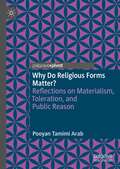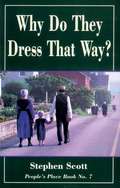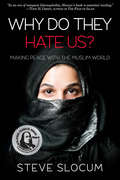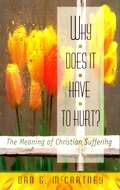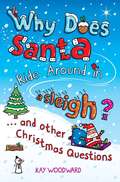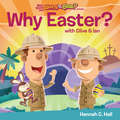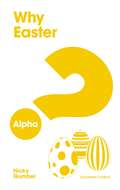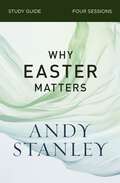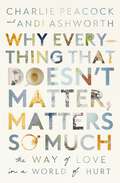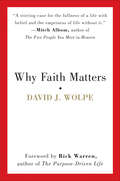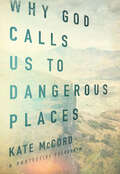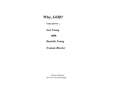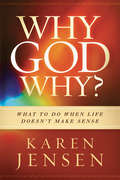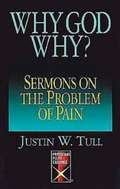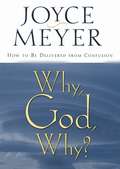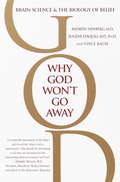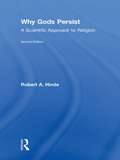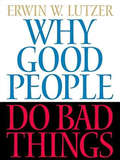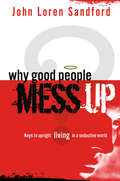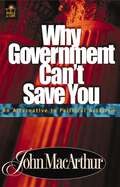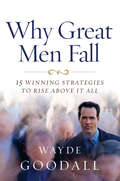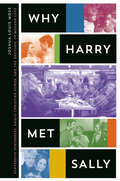- Table View
- List View
Why Do Religious Forms Matter?: Reflections on Materialism, Toleration, and Public Reason
by Pooyan Tamimi ArabIn Why Do Religious Forms Matter?, Pooyan Tamimi Arab reflects on the Early Modern roots and contemporary relevance of a materialist perspective on the politics of religious diversity.Taking as a starting point the insight that religions manifest in myriad sensible forms—in architecture, in images, in the use of objects in rituals, and in distinctive ways of speaking—Tamimi Arab traces to Spinoza the material-religion approach prevalent in anthropology and religious studies. It is in Locke’s political philosophy, however, that forms are tied to toleration—understood as a neutrally applied civil right—which Tamimi Arab discusses through contemporary case studies of mosque construction, amplified calls to prayer, and the right to ritual slaughter.Going beyond the Enlightenment criticism and toleration of religions, the book concludes with an inclusive reading of Rawls’s ideal of public reason, which assumes forms of discourse—religious and non-religious—to always be several. Religious forms thus turn out to be indispensable to liberal democracy itself.
Why Do They Dress That Way?: People's Place Book No. 7
by Stephen ScottThis unique book, by a man who has chosen to "dress plain," describes the history and use of hats, bonnets, dresses, overcoats, and other articles of clothing used by the various religious groups who wear plain garb. This is the first comprehensive book about why more than 150,000 persons in North America wear plain clothes for religious reasons. Who are the various people who dress plain? Where do they live? Why do they do it? Where did the plain pattern come from? Don't they ever change? Answers to some common objects to plain dress! Will plain dress survive? Authoritative, yet gentle in tone, this book will be of interest to many readers.
Why Do They Hate Us?: Making Peace with the Muslim World
by Steve Slocum”Effectively countering pernicious, misinformed narratives, this is an essential contribution to interfaith studies." —Publishers Weekly ”Well-researched, cogently argued… avoids clichés and deeply examines the complex relationship between Islam and the West.”—Booklist,starred review ”A clear, concise, and thoughtful introduction to Islam.” —Kirkus With Americans still in shock after watching packed airliners slam into the twin towers, George W. Bush asked America, “Why do they hate us?” After 9/11, the world became more fearful, and acts of terrorism were prominent in the news cycles. In Why Do They Hate Us?, author Steve Slocum takes the spotlight off the extremists and instead exposes the heart of the everyday Muslim through Christian outreach. ”In an era of rampant Islamophobia, Slocum's book is essential reading.” - Todd H. Green, author of The Fear of Islam: An Introduction to Islamophobia in the WestWhy Do They Hate Us? brings the story of Mohammed to life and unveils the storied history of Islam with refreshing detail. Slocum clears up common misconceptions about jihad, Sharia law and the role of women in Islam. He then connects the dots for readers of all faiths between cause and effect for the rise in Islamophobia. Finally, Slocum suggests practical ways to overcome societal fears by face-to-face interaction with our Muslim neighbors.Why Do They Hate Us? is sprinkled with stories from the lives of everyday Muslims and anecdotes from Slocum’s time in Kazakhstan, allowing the reader to catch a glimpse of a different side of Muslims than portrayed in the media.“Before reading this book I knew very little about Islam despite a pastoral career. I now feel like I know much more. It left me with a hunger to befriend Muslims.” - Pastor Martha Freeman, M.Div.
Why Does It Have to Hurt?: The Meaning of Christian Suffering
by Dang McCartneyDan McCartney delves into Scripture to help Christians understand the meaning of suffering and why they suffer. Avoiding trite responses, he moves us to a better knowledge of our heavenly Father's purposes in our suffering and leads us to the rest and peace we have in Jesus Christ.
Why Does Santa Ride Around in a Sleigh?: . . . and Other Christmas Questions
by Kay WoodwardA cool Christmas-themed book for girls and boys that explains the reasons for and the stories behind our festive celebrations and traditions. Why does Father Christmas have three different names? Was there ever really a Good King Wenceslas? Why do we eat mince pies? These questions and many more are answered along with a fun make-and-do Christmas activity. Entertaining and informative, the book is illustrated throughout in black and white.
Why Easter?
by Hannah C. HallBased on the bestselling video series What's in the Bible?, Why Easter? features a foundational faith concept and charming illustrations to help parents teach preschoolers why we celebrate Easter.Clive laughed. ". . .But colorful eggs and fluffy bunnies aren't what Easter is about anyway.""They aren't?" Ian asked. "Why do we celebrate Easter then?"As brothers Clive and Ian dye Easter eggs and discuss their favorite things about the holiday-the Easter pony . . . or is it a bunny . . . or perhaps an Easter chicken?-Clive explains that Easter is about more than colorful eggs and fluffy bunnies. So why do we celebrate Easter? The answer is as exciting as it is wonderful: because of Jesus!
Why Easter? Expanded Edition
by Nicky GumbelPrepare for your guests this Easter with a wonderful evangelistic booklet by Nicky Gumbel. Like Gumbel's Why Jesus?, this booklet is a concise and easy-to-read study of the very real questions surrounding Jesus that people might be thinking about at Easter:Who is Jesus?Why do we need him?Why did he have to die?Why does he matter to my life today?With hearts particularly open in the Easter season, these booklets are an effective evangelistic tool to pass out to guests at your services, sharing the Gospel in a warm and relevant way.Alpha is based on a pattern found in the New Testament of people bringing their friends, family, and work colleagues to meet Jesus. Alpha is an easy way to say to friends, "Come and see, come and explore your questions, come and hear about Jesus, come and see for yourself." Everyone is welcome at Alpha, but the program is designed especially for people who would not describe themselves as Christians or church-goers.
Why Easter Matters Bible Study Guide
by Andy StanleyHave you ever been at odds with God?Have you resisted, defied, or tried to bargain your way out of what you thought God wanted?You aren&’t alone. Scripture documents similar stories.In this Easter Study Andy Stanley looks at some of the people whose lives intersected with Jesus in the weeks leading to his crucifixion. Each of them had an agenda that put them at odds with God and Jesus. As you&’ll see, there&’s a little bit of them in all of us.The Why Easter Matters Study Guide includes session overviews, video teaching notes, discussion questions, personal reflection material, and a leader&’s guide.Sessions include:The High Cost of Following ChristThe Risk of Surrendering to GodThe God Who Can Be TrustedThe Foundation of Our FaithDesigned for use with the Who Needs Christmas / Why Easter Matters Video Study (9780310121121), sold separately. Streaming video also available.
Why Everything That Doesn't Matter, Matters So Much: The Way of Love in a World of Hurt
by Andi Ashworth Charlie PeacockA hopeful and practical model for what it means to be a Christian and a culture-maker in a world of hurt and wondrous possibility, from multi–Grammy winner Charlie Peacock and his wife and author, Andi Ashworth.Do you feel powerless and overwhelmed by the pain and suffering all around you? Have you ever asked, What can I do to mend the world, my family, or my own life? And if I could, why bother? Does my own small part even matter? If so, here comes hope from two guides who are further down the road. Charlie and Andi have written a collection of letters to Christians and spiritual seekers who think deeply and care acutely about the state of the world and their personal spheres of influence.In Why Everything That Doesn't Matter, Matters So Much, beloved and trusted mentors, Charlie and Andi offer you:Thought-provoking explorations into the many facets of Christian culture care and making, from the kitchen to Carnegie Hall.Practical guidance for how to care for and improve the quality of human life, locally and globally, no matter your vocation.A theology of imagination and creativity that provides a framework for all of life.A model for expressing love in marriage, friendship, citizenship, and every kind of work—even in the midst of cynicism, fear, exhaustion, and oppression. It might be said of Christians that our lives are either moving in the direction of the redemption Jesus has on offer, or away from it. Each of these letters is a gentle nudge in the direction of God's powerfully ordinary purpose for each of us, no matter what the future holds, to participate fully in the beautiful, redemptive work of Christ.
Why Faith Matters
by David J. WolpeWith the simultaneous rise of New Atheism and popularity of fundamentalist movements, a rational, open-minded debate on the role of religion today is sorely needed. Why Faith Matters is an excellent start – an articulate, nondenominational defense of established religion in America by the man Newsweek named the #1 Pulpit Rabbi in America. David J. Wolpe makes a strong case in favor of faith, replacing both the cold reason of atheism and the virulent hatred of fanaticism with a vision of religion that is informed by faith, love, and understanding. He explores the origins and nature of faith, the role of the Bible in modern life, and the compatibility of God and science. Why Faith Matters shows that there is still a place for God, faith, and religion in today’s world. Named the #1 Pulpit Rabbi in America by Newsweek, David J. Wolpe is a senior rabbi at the Sinai Temple of Los Angeles and a teacher at UCLA. Rabbi Wolpe writes for many publications, including New York Jewish Week, Jerusalem Post, Los Angeles Times, and Beliefnet.com. He has appeared as a commentator on CNN and “CBS This Morning”, and has been featured on the History Channel’s “Mysteries of the Bible.” He is the author of six previous books, including the national bestseller Making Loss Matter: Creating Meaning in Difficult Times. Rabbi Wolpe lives in Los Angeles with his wife and daughter. “A reasoned argument and spiritual autobiography. Rabbi Wolpe is a graceful writer, an insightful thinker, and a wide reader.” – Jewish Week
Why God Calls Us to Dangerous Places
by Kate McCord"Perhaps that&’s the greatest reason why He calls us to dangerous places: so that we will know His astonishing, sacrificial, life-restoring love.&”Why God Calls Us to Dangerous Places is about what is lost and what is gained when we follow God at any cost. Soon after 9/11, Kate McCord left the corporate world and followed God to Afghanistan—sometimes into the reach of death. Alive but not unscathed, she has suffered the loss of many things: comfort, safety, even dear friends and fellow sojourners.But Kate realizes that those who go are not the only ones who suffer. Those who love those who go also suffer. This book is for them, too. Weaving together Scripture, her story, and stories of both those who go and those who send, Kate considers why God calls us to dangerous places and what it means for all involved.It means dependence. It means loss. It means a firmer hold on hope. It can mean death, trauma, and heavy sorrow. But it can also mean joy unimaginable. Through suffering, we come closer to the heart of God. Written with the weight of glory in the shadow of loss, Why God Calls Us to Dangerous Places will inspire Christians to count the cost—and pay it.
Why God Calls Us to Dangerous Places
by Kate McCord"Perhaps that&’s the greatest reason why He calls us to dangerous places: so that we will know His astonishing, sacrificial, life-restoring love.&”Why God Calls Us to Dangerous Places is about what is lost and what is gained when we follow God at any cost. Soon after 9/11, Kate McCord left the corporate world and followed God to Afghanistan—sometimes into the reach of death. Alive but not unscathed, she has suffered the loss of many things: comfort, safety, even dear friends and fellow sojourners.But Kate realizes that those who go are not the only ones who suffer. Those who love those who go also suffer. This book is for them, too. Weaving together Scripture, her story, and stories of both those who go and those who send, Kate considers why God calls us to dangerous places and what it means for all involved.It means dependence. It means loss. It means a firmer hold on hope. It can mean death, trauma, and heavy sorrow. But it can also mean joy unimaginable. Through suffering, we come closer to the heart of God. Written with the weight of glory in the shadow of loss, Why God Calls Us to Dangerous Places will inspire Christians to count the cost—and pay it.
Why, God? Come and See
by Joel Young Danielle Young Truman BlockerWhy, God? Come and See ... answers difficult questions in a captivating and enlightening manner. These answers make it easier to trust GOD and to love HIM, when you see HIM for WHO HE truly IS. Unique to our book is the fact that most of the questions are answered from three perspectives, the serious Bible student or scholar, the growing Christian or enquiring mind, and the gut-level man-on-the-street.
Why, God, Why?: What to Do When Life Doesn't Make Sense
by Karen Jensen“Why do bad things happen?” “God, I don’t understand!” Heartbreak and loss happen to us all. On New Year’s Day, at the age of thirty-seven, Karen Jensen’s husband died suddenly in his bed, leaving her alone to raise two grieving boys and pastor a bewildered congregation. Despite her strong faith and love for God, she had some serious questions. Has tragedy shaken the foundation of your life? Have you been blindsided by an event you never expected to face? What should we do when we’re going through the dark places in life? …when we’ve lost everything? …when we’re in pain? …when we’re wondering why? With a mix of sharp insight and warm optimism, Karen skillfully combines experience and scripture to guide you through the land mines of doubt and confusion that come with loss. She then provides solid principles for moving forward past the pain and into a brighter future.
Why God Why?: Sermons on the Problem of Pain (Protestant Pulpit Exchange)
by Justin W. TullThis collection of sermons explores the age-old question of why a loving God allows suffering to visit His children. Tull encourages readers to ask why in good times as well as in difficult ones, to examine God's eternal presence in times of blessed joy as well as during sorrow and care. He emphasizes scriptures and anecdotes that illustrate God's comfort and grace during all situations in our lives.
Why, God, Why? How to Be Delivered from Confusion: How to Be Delivered from Confusion
by Joyce MeyerA guide to letting go of the question "Why?" and trust in God's plan for you.
Why God Won't Go Away: Brain Science and the Biology of Belief
by Andrew Newberg Eugene G. D'AquiliWhy have we humans always longed to connect with something larger than ourselves? Why does consciousness inevitably involve us in a spiritual quest? Why, in short, won't God go away? Theologians, philosophers, and psychologists have debated this question through the ages, arriving at a range of contradictory and ultimately unprovable answers. But in this brilliant, groundbreaking new book, researchers Andrew Newberg and Eugene d'Aquili offer an explanation that is at once profoundly simple and scientifically precise: the religious impulse is rooted in the biology of the brain. Newberg and d'Aquili base this revolutionary conclusion on a long-term investigation of brain function and behavior as well as studies they conducted using high-tech imaging techniques to examine the brains of meditating Buddhists and Franciscan nuns at prayer. What they discovered was that intensely focused spiritual contemplation triggers an alteration in the activity of the brain that leads us to perceive transcendent religious experiences as solid and tangibly real. In other words, the sensation that Buddhists call "oneness with the universe" and the Franciscans attribute to the palpable presence of God is not a delusion or a manifestation of wishful thinking but rather a chain of neurological events that can be objectively observed, recorded, and actually photographed.The inescapable conclusion is that God is hard-wired into the human brain.In Why God Won't Go Away, Newberg and d'Aquili document their pioneering explorations in the field of neurotheology, an emerging discipline dedicated to understanding the complex relationship between spirituality and the brain. Along the way, they delve into such essential questions as whether humans are biologically compelled to make myths; what is the evolutionary connection between religious ecstasy and sexual orgasm; what do Near Death Experiences reveal about the nature of spiritual phenomena; and how does ritual create its own neurological environment. As their journey unfolds, Newberg and d'Aquili realize that a single, overarching question lies at the heart of their pursuit: Is religion merely a product of biology or has the human brain been mysteriously endowed with the unique capacity to reach and know God?Blending cutting-edge science with illuminating insights into the nature of consciousness and spirituality, Why God Won't Go Away bridges faith and reason, mysticism and empirical data. The neurological basis of how the brain identifies the "real" is nothing short of miraculous. This fascinating, eye-opening book dares to explore both the miracle and the biology of our enduring relationship with God.
Why Gods Persist: A Scientific Approach to Religion
by Robert A. Hinde Robert HindeWhat is it about religion that appeals to people? Why do religions and religious beliefs persist in the face of increasing secularisation, harsh criticism and even political persecution? Robert Hinde argues that it is not enough simply to criticize religion, we must understand it - not only how it causes so much conflict, but also how it brings comfort to many. Hinde, a distinguished scientist, draws on a wide range of psychological, developmental and evolutionary research to explore this fascinating question. This second edition of Why Gods Persist is designed for everyone interested in the subject, either as a student of psychology and anthropology of religion or as a follower of the current controversies over the value of religious belief.
Why Good People Do Bad Things
by Erwin LutzerWe are all deceived, driven by selfish desires, and incapable of doing what we know to be right in our own human strength. Premier Bible teacher Dr. Erwin Lutzer explains the hopeful reality that change is possible through the sometimes painful process of God-given revelation and honesty.
Why Good People Mess Up: Keys to upright living in a seductive world
by John Loren SandfordWhy Good People Mess UpBy John Loren Sandford Why do good people fall into immorality? This book describes powerful, unseen forces that drive some Christians into adultery, fornication, homosexuality, incest, and other sexual sins. It includes practical guidelines and understanding for everyone involved—help and hope for the believer who wants to stand in the face of overwhelming sexual compulsions, and forgiveness and knowledge for one who has been hurt by leaders who have fallen. About the AuthorJOHN LOREN SANDFORD graduated from theological seminary with an M. Div. in religion. He pastored churches for twenty-one years before founding Elijah House.
Why Government Can't Save You: An Alternative to Political Activism
by John MacarthurThe Lord did not come as a political deliverer or social reformer. He did not rally supporters in a grandiose attempt to "capture the culture" for morality or greater political and religious freedom. Rather, His divine calling was to rescue the lost souls of individual men and women from sin and hell. In Why Government Can't Save You: An Alternative to Political Activism, author John MacArthur illustrates through Scripture that, regardless of the numerous immoral, unjuust, and ungodly failures of secular government, believers are to pray and seek to influence the world for Christ by godly, selfless, and peaceful living under that authority, not by protests against the government or by acts of civil disobedience. Dr. MacArthur will explore these areas: Christians' responsibility to authority How and why we should support our leaders How to live righteously in a pagan culture The principle of paying taxes Jesus' lessons on tax exemptions The biblical purpose of government The principle and reasons for civil obedience. "To devote all, or even most, of our time, energy, money, and strategy to putting a façade of morality on the world or the appearance of 'rightness' over our governmental and political institutions is to badly misunderstand our roles as Christians in a spiritually lost world." ?John MacArthur
Why Great Men Fall
by Wayde GoodallYour head sits heavily in your hands as the last employee turns out the last light and goes home for the night, leaving you alone in the dark with your failure and desperation. This scene is played-out daily in offices all over America, as leaders in corporations, churches, and organizations free-fall from moral or ethical failure. Wayde Goodall has observed this quagmire for decades, counseling those who have thrown away their families and their futures for a moment of pleasure or profit. Profiling well-known leaders who've had a fall from grace, Goodall notes the common traits, warning signs, and most importantly, a plan for avoiding such deadly traps of the soul. For everyone who has found himself in this terrible dilemma, and to those who can still avoid it, this book is like a beacon. There is a fail-safe guide for remaining on the right path, and Why Great Men Fall illustrates that safe route in a riveting way. One after the other, great men are falling like dominoes as they defy the profound wisdom of Scripture, make themselves into their own god and satisfy their most base desires. If you are already experiencing substantial fame, power or wealth or, more importantly, if you are approaching that possibility in your life, this well be one of the most important books you will ever read. -Barry Meguiar, President/CEO of Meguiar?s, Inc, and host of FOX?s Speed Channel program, Car Crazy Television Wayde Goodall has shared a brief but masterful guide to leadership in WHY GREAT MEN FALL. Having known Wayde as an exceptional leader for over 20 years, it is obvious that this is the life story and lessons learned by a great, humble leader whose "life lessons" blended with the truth of God's Word, give us a page turner that addresses the personal issues of today. -Dr. Tom Phillips, Director of the Billy Graham Cove & Director of Crusades for Billy Graham Crusades Anyone can read the headlines. It takes a finer mind to go behind the faces of scandalized celebrities and their lurid exploits. Dr. Goodall combines discernment, insight, and an engaging contemporaneity to turn the tale of the fallen into wisdom for those willing to learn.-Mark Rutland, President, Southeastern University
Why Harry Met Sally: Subversive Jewishness, Anglo-Christian Power, and the Rhetoric of Modern Love
by Joshua Louis MossFrom immigrant ghetto love stories such as The Cohens and the Kellys (1926), through romantic comedies including Meet the Parents (2000) and Knocked Up (2007), to television series such as Transparent (2014–), Jewish-Christian couplings have been a staple of popular culture for over a century. In these pairings, Joshua Louis Moss argues, the unruly screen Jew is the privileged representative of progressivism, secular modernism, and the cosmopolitan sensibilities of the mass-media age. But his/her unruliness is nearly always contained through romantic union with the Anglo-Christian partner. This Jewish-Christian meta-narrative has recurred time and again as one of the most powerful and enduring, although unrecognized, mass-culture fantasies. Using the innovative framework of coupling theory, Why Harry Met Sally surveys three major waves of Jewish-Christian couplings in popular American literature, theater, film, and television. Moss explores how first-wave European and American creators in the early twentieth century used such couplings as an extension of modernist sensibilities and the American “melting pot.” He then looks at how New Hollywood of the late 1960s revived these couplings as a sexually provocative response to the political conservatism and representational absences of postwar America. Finally, Moss identifies the third wave as emerging in television sitcoms, Broadway musicals, and “gross-out” film comedies to grapple with the impact of American economic globalism since the 1990s. He demonstrates that, whether perceived as a threat or a triumph, Jewish-Christian couplings provide a visceral, easily graspable, template for understanding the rapid transformations of an increasingly globalized world.
Why Harry Met Sally: Subversive Jewishness, Anglo-Christian Power, and the Rhetoric of Modern Love
by Joshua Louis MossFrom immigrant ghetto love stories such as The Cohens and the Kellys (1926), through romantic comedies including Meet the Parents (2000) and Knocked Up (2007), to television series such as Transparent (2014–), Jewish-Christian couplings have been a staple of popular culture for over a century. In these pairings, Joshua Louis Moss argues, the unruly screen Jew is the privileged representative of progressivism, secular modernism, and the cosmopolitan sensibilities of the mass-media age. But his/her unruliness is nearly always contained through romantic union with the Anglo-Christian partner. This Jewish-Christian meta-narrative has recurred time and again as one of the most powerful and enduring, although unrecognized, mass-culture fantasies. Using the innovative framework of coupling theory, Why Harry Met Sally surveys three major waves of Jewish-Christian couplings in popular American literature, theater, film, and television. Moss explores how first-wave European and American creators in the early twentieth century used such couplings as an extension of modernist sensibilities and the American “melting pot.” He then looks at how New Hollywood of the late 1960s revived these couplings as a sexually provocative response to the political conservatism and representational absences of postwar America. Finally, Moss identifies the third wave as emerging in television sitcoms, Broadway musicals, and “gross-out” film comedies to grapple with the impact of American economic globalism since the 1990s. He demonstrates that, whether perceived as a threat or a triumph, Jewish-Christian couplings provide a visceral, easily graspable, template for understanding the rapid transformations of an increasingly globalized world.
